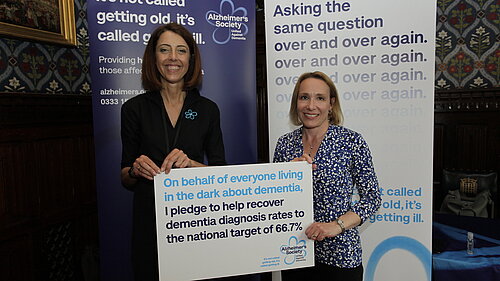Helen Morgan urges action to improve dementia diagnosis rates

MP Helen Morgan is urging people to get checked for dementia and improve diagnosis rates after taking part in Dementia Action Week 2022.
The North Shropshire MP spent time learning about diagnosing dementia and why early recognition is so crucial after hearing from several constituents affected by the condition.
Helen met with people affected by dementia, experts from Alzheimer’s Society and clinicians in Parliament to find out more about the barriers people face to getting a diagnosis.
There are currently around 5,720 people living with dementia in Shropshire, with a total of 900,000 across the UK, which is set to rise to 1.6 million by 2040.
However, with diagnosis rates currently at a five-year low after the pandemic, the charity believes there are tens of thousands of people now living with undiagnosed dementia. This means they don’t have access to the vital care and support that a diagnosis can bring.
Only 60 per cent of people living with dementia in Shropshire are thought to have been diagnosed, down from 69.4 per cent before the pandemic.
New research from Alzheimer’s Society shows some people don’t seek a diagnosis because they think memory loss is just part of getting old, don’t recognise the signs of dementia, or are in denial about their symptoms.
Helen pledged her support to Alzheimer’s Society Dementia Action Week campaign – “It’s not called getting old, it’s called getting ill” – which aims to raise awareness of the symptoms of dementia and encourage people worried about symptoms to seek a diagnosis.
Helen said: “I know many people who have been affected by dementia, or who have loved ones who have been diagnosed with dementia, and it is an issue close to the hearts of many people in North Shropshire.
“Early diagnosis is key to effectively treating dementia and that’s why I’m encouraging everyone who thinks they have symptoms to visit their GP and get themselves checked out.
“Dementia is not a normal part of ageing and is not just about memory loss.
“One people in four have battled dementia symptoms for over two years before getting a diagnosis. Anyone worried that they or a loved one may have dementia, should contact Alzheimer’s Society for advice and support.”
James White, Head of Public Affairs and Campaigns at Alzheimer’s Society, said: “We thank Helen Morgan for meeting with us, and showing her support this Dementia Action Week.
“Asking the same question over and over again is not called getting old, it’s called getting ill. We know getting a dementia diagnosis can be daunting, but we want everyone to be able to understand and recognise potential dementia symptoms, feel empowered to take the next steps, and come to Alzheimer’s Society for support.
“National diagnosis rates are currently at a five-year low so it is so important that we do everything we can to get people diagnosed so they can get treatment and support. We have launched new resources to arm people with all the information they need when speaking with their GP, which includes online support and advice and a new symptoms checklist which can be printed and taken to the doctor to help both patients and clinicians have an easier diagnosis experience.”
Support and more information about a diagnosis is just a phone call or a click away. Visit alzheimers.org.uk/memoryloss or call Alzheimer’s Society on 0333 150 3456.
